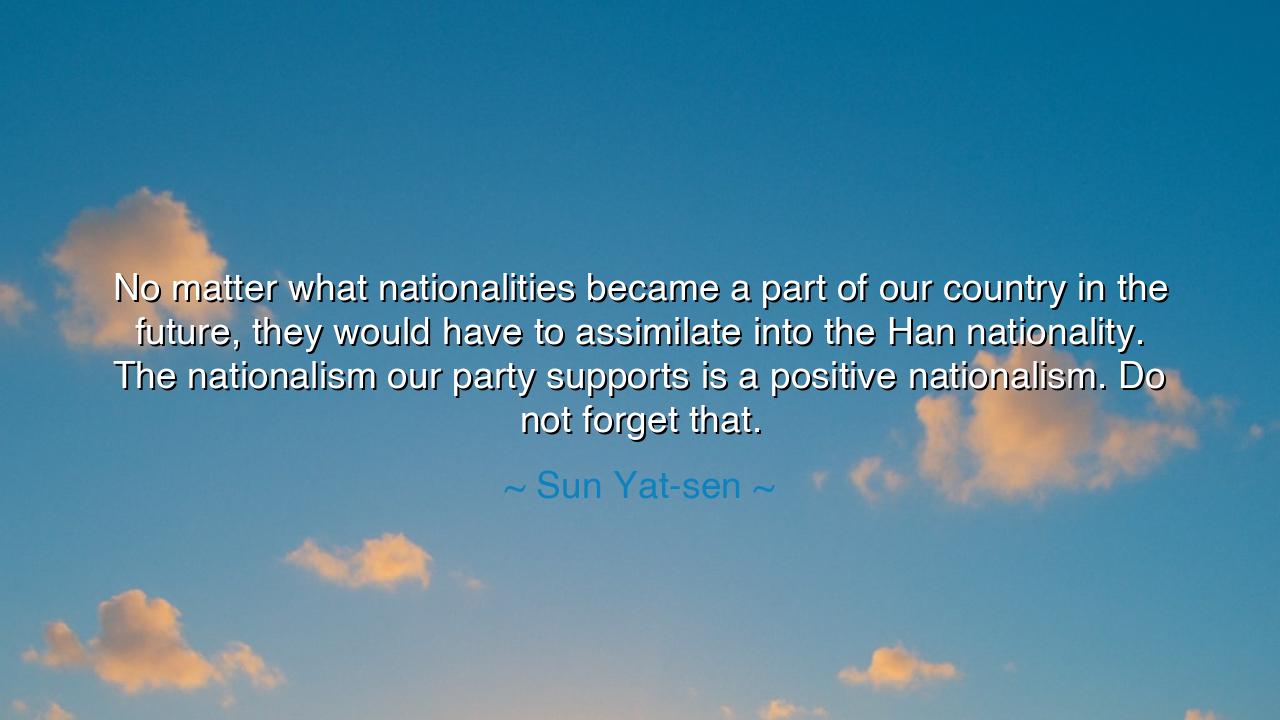
No matter what nationalities became a part of our country in the
No matter what nationalities became a part of our country in the future, they would have to assimilate into the Han nationality. The nationalism our party supports is a positive nationalism. Do not forget that.






On the Unity of a Nation and the Vision of Sun Yat-sen
When Sun Yat-sen, the founding father of modern China, proclaimed, “No matter what nationalities became a part of our country in the future, they would have to assimilate into the Han nationality. The nationalism our party supports is a positive nationalism. Do not forget that,” he spoke not merely as a political leader, but as a prophet of unity, gazing upon a land long divided and yearning for cohesion. His words were born in an age of turmoil — a time when China was torn by warlords, weakened by imperial powers, and fractured by internal divisions. To Sun Yat-sen, the dream of national rebirth demanded a single spirit — not to erase diversity, but to forge a shared identity strong enough to protect the nation from collapse.
To assimilate into the Han nationality, in Sun’s vision, did not mean blind conformity, but the merging of many rivers into one vast sea. The Han were not simply an ethnic majority; they represented the heart of Chinese civilization — the vessel that carried its language, ethics, and spirit across millennia. Sun saw that without a unifying culture, the land would remain vulnerable to foreign domination and internal discord. Thus, he sought to build a positive nationalism, one that would inspire love for the nation rather than hatred of the other. It was to be a nationalism of purpose, not prejudice; of shared destiny, not exclusion.
To understand his words, we must remember the world in which they were spoken. The early twentieth century was a time when the ancient empires of the East lay broken under the boots of imperial powers. China, once mighty and self-sufficient, had become a wounded dragon — humiliated by invasions, opium, and treaties that stripped it of pride. Sun Yat-sen, witnessing the decay of his homeland, realized that no single province, clan, or tribe could stand alone. Unity, he believed, was not optional; it was survival itself. Just as the human body cannot live if its limbs fight one another, so too could a nation not endure if its people were divided by race or region.
The “positive nationalism” Sun envisioned was a response to the poisonous nationalisms spreading across the world — ideologies that sought superiority through domination and conquest. His was different: it was the nationalism of renewal, rooted in the Confucian ideals of harmony, righteousness, and shared virtue. He dreamed of a China that would reclaim its strength through moral unity, not aggression. Like the philosopher Mencius, who taught that the heart of benevolence was the foundation of a just kingdom, Sun believed that love for one’s nation must not come at the expense of humanity. The power of national identity, he warned, should uplift, not oppress.
History offers many examples of such unity born from diversity. The Roman Empire, in its golden age, embraced peoples from every corner of its domain — Gauls, Greeks, Egyptians, and Syrians — yet bound them under the idea of Romanitas, the shared Roman identity. Through that unity, Rome rose to greatness. But when that shared identity decayed, and factions grew, the empire crumbled. Sun Yat-sen, scholar of both East and West, understood this lesson well. He sought to bind China together through a common consciousness — one not defined merely by blood, but by shared loyalty to the idea of China itself.
And yet, his vision was not without tension. To ask that all peoples “assimilate” into one culture is to walk a narrow path between harmony and uniformity. For the spirit of a nation grows not only through unity but through the preservation of difference. The true test of Sun’s dream, then, lies not in erasing the colors of China’s tapestry, but in weaving them into a pattern strong enough to endure. The positive nationalism he spoke of must, in every age, be guarded from becoming its opposite — from turning pride into arrogance, or unity into oppression.
The lesson we draw from Sun Yat-sen’s words is timeless: a nation cannot thrive without shared purpose, yet that purpose must be guided by compassion. To build unity, one must first cultivate understanding. The people of any land — of any age — must see themselves not as fragments of tribe or region, but as threads of a greater fabric. This does not mean silencing differences, but harmonizing them, as diverse instruments in one grand symphony.
So let every generation remember the charge of Sun Yat-sen: “Do not forget that.” Do not forget that nationalism, when noble, is a force of healing — but when twisted, it becomes destruction. Seek the kind of patriotism that uplifts without conquering, that strengthens without dividing, that unites not through fear, but through shared hope. For only through such positive nationalism can a people, whether in China or beyond, stand tall in the winds of history — not as conquerors, but as stewards of a destiny greater than themselves.






AAdministratorAdministrator
Welcome, honored guests. Please leave a comment, we will respond soon